When believers make political nuisances of themselves, readers can count on one thing: Some editorial writer somewhere will appeal to the “constitutionally mandated separation of church and state.”
Listening to the most rigid champions of church-state separation, one could decide that all religiously inspired political speech chips away at the foundations of our democratic republic.
Some Americans may not realize that the Constitution does not refer to “separation of church and state.” The First Amendment stipulates that “Congress shall make no law respecting an establishment of religion, or prohibiting the free exercise thereof.”
The phrase “separation of church and state” appears, rather, in a letter that President Thomas Jefferson wrote to the Danbury (Conn.) Baptist Association in January 1802. In the 200 years since Jefferson wrote that letter, politicians and believers have debated the meaning of his phrase with a passion usually reserved for interpreting Scripture.
Two books published this year will help clarify Jefferson’s intent. Despite their plain-vanilla titles and drab covers, Philip Hamburger’s Separation of Church and State (Harvard) and Daniel L. Dreisbach’s Thomas Jefferson and the Wall of Separation Between Church and State (New York University Press) are vigorous critiques of separationist dogmas.
Dreisbach, a professor in American University’s Department of Justice, Law, and Society, writes that Jefferson “saw no contradiction in authoring a religious proclamation as a state official and refusing to issue a similar proclamation as the federal chief executive.” Dreisbach further argues that Jefferson’s wall separated the federal government from churches and state governments, rather than separating churches from all levels of government.
Hamburger, who teaches law at the University of Chicago, inflicts greater damage to absolute separationist readings of American history. Hamburger documents that the contemporary understanding of church-state separation is rooted far less in Jefferson than in Hugo Black, the Supreme Court justice who wrote the majority opinion in Everson v. Board of Education (1947). And Black’s advocacy of church-state separation, in turn, found its roots in the fierce anti-Catholicism of the Masons and the Ku Klux Klan (Black was a Kladd of the Klavern, or an initiator of new members, in his home state of Alabama in the early 1920s).
Hamburger does not cast Black as a one-dimensional villain. He records that Black’s opinion in Everson, while it argued for an “impregnable wall” of church-state separation, still managed to anger the separationists of his time because it ultimately approved transportation subsidies for Catholic schools.
Since then, however, Black’s notion of the church-state wall has become so widely accepted that it provides the atmospheric lighting for most interpretations of the First Amendment. Those who have followed in Black’s path see any subsidy for Catholic (or Protestant) schools as one of the four horsemen of the Apocalypse (if they believe in the Apocalypse).
Entire decades of anti-religious theories do not crumble simply because academic publishers release two critical books. Nevertheless, these books by Hamburger and Dreisbach mark a renewed scholarly critique of separationist pieties. It’s too early in this quiet revolution to know what it could mean for the future of political activity by churches, but the initial signs are encouraging. We do not yearn for an established church or a civil union (much less a marriage) of church and state. Still, we would bid good riddance to the bigoted view that God-fearing people had best keep their opinions to themselves.
Copyright © 2002 Christianity Today. Click for reprint information.
Related Elsewhere
Separation of Church and State and Thomas Jefferson and the Wall of Separation Between Church and State are available at Amazon.com.










